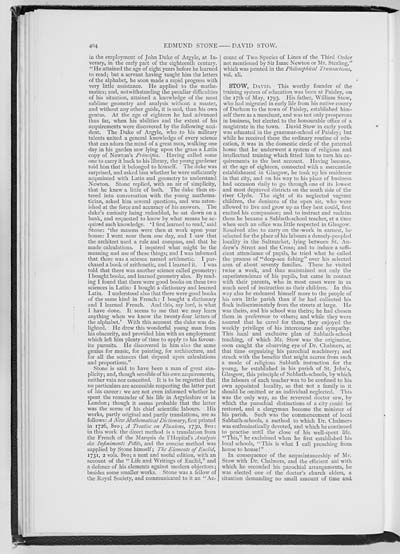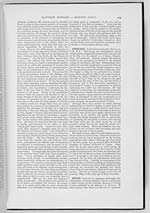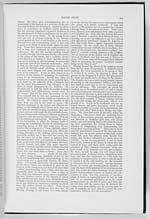Volume 3 > Half-Volume 6
(50) Page 404 - Stow, David
Download files
Individual page:
Thumbnail gallery: Grid view | List view

404 in the employment of John Duke of Argyle, at In- verary, in the early part of the eighteenth century. "He attained the age of eight years before he learned to read; but a servant having taught him the letters of the alphabet, he soon made a rapid progress with very little assistance. He applied to the mathe- matics; and, notwithstanding the peculiar difficulties of his situation, attained a knowledge of the most sublime geometry and analysis without a master, and without any other guide, it is said, than his own genius. At the age of eighteen he had advanced thus far, when his abilities and the extent of his acquirements were discovered by the following acci- dent. The Duke of Argyle, who to his military talents united a general knowledge of every science that can adorn the mind of a great man; walking one day in his garden saw lying upon the grass a Latin copy of Newton's Principia. Having called some one to carry it back to his library, the young gardener told him that it belonged to himself. The duke was surprised, and asked him whether he were sufficiently acquainted with Latin and geometry to understand Newton. Stone replied, with an air of simplicity, that he knew a little of both. The duke then en- tered into conversation with the young mathema- tician, asked him several questions, and was aston- ished at the force and accuracy of his answers. The duke's curiosity being redoubled, he sat down on a bank, and requested to know by what means he ac- quired such knowledge. ' I first learned to read,' said Stone: 'the masons were then at work upon your house: I went near them one day, and I saw that the architect used a rule and compass, and that he made calculations. I inquired what might be the meaning and use of these things; and I was informed that there was a science named arithmetic. I pur- chased a book of arithmetic, and I learned it. I was told that there was another science called geometry: I bought books, and learned geometry also. By read- ing I found that there were good books on these two sciences in Latin: I bought a dictionary and learned Latin. I understood also that there were good books of the same kind in French: I bought a dictionary and I learned French. And this, my lord, is what I have done. It seems to me that we may learn anything when we know the twenty-four letters of the alphabet.' With this account the duke was de- lighted. He drew this wonderful young man from his obscurity, and provided him with an employment which left him plenty of time to apply to his favour- ite pursuits. He discovered in him also the same genius for music, for painting, for architecture, and for all the sciences that depend upon calculations and proportions." Stone is said to have been a man of great sim- plicity; and, though sensible of his own acquirements, neither vain nor conceited. It is to be regretted that no particulars are accessible respecting the latter part of his career: we are not even informed whether he spent the remainder of his life in Argyleshire or in London; though it seems probable that the latter was the scene of his chief scientific labours. His works, partly original and partly translations, are as follows: A New Mathematical Dictionary, first printed in 1726, 8vo; A Treatise on Fluxions, 1730, 8vo: in this work the direct method is a translation from the French of the Marquis de 1'Hopital's Analysis des Infiniments Petits, and the concise method was supplied by Stone himself; The Elements of Euclid, 1731, 2 vols. 8vo; a neat and useful edition, with an account of the " Life and Writings of Euclid," and a defence of his elements against modern objectors; besides some smaller works. Stone was a fellow of the Royal Society, and communicated to it an "Ac- count of Two Species of Lines of the Third Order not mentioned by Sir Isaac Newton or Mr. Sterling," which was printed in the Philosophical Transactions, vol. xli. STOW, DAVID. This worthy founder of the training system of education was born at Paisley, on the 17th of May, 1793. His father, William Stow, who had migrated in early life from his native county of Durham to the town of Paisley, established him- self there as a merchant, and was not only prosperous- in business, but elected to the honourable office of a magistrate in the town. David Stow in early youth was educated in the grammar-school of Paisley; but while he received there the ordinary routine of edu- cation, it was in the domestic circle of the paternal home that he underwent a system of religious and intellectual training which fitted him to turn his ac- quirements to the best account. Having become, at the age of eighteen, connected with a mercantile establishment in Glasgow, he took up his residence in that city, and on his way to his place of business had occasion daily to go through one of its lowest and most depraved districts on the south side of the river Clyde. The sight of its neglected vagrant children, the denizens of the open air, who were allowed to live and grow up as they best could, first excited his compassion; and to instruct and reclaim them he became a Sabbath-school teacher, at a time when such an office was little respected in Glasgow. Resolved also to carry on the work in earnest, he selected for the place of his labours a densely-peopled locality in the Saltmarket, lying between St. An- drew's Street and the Cross; and to induce a suffi- cient attendance of pupils, he tried what he called the process of "deep-sea fishing" over his selected area of about seventy families. These he visited twice a week, and thus maintained not only the superintendence of his pupils, but came in contact with their parents, who in most cases were in as much need of instruction as their children. In this way also he endeared himself more to the people of his own little parish than if he had collected his flock indiscriminately from the streets at large. He was theirs, and his school was theirs; he had chosen them in preference to others; and while they were assured that he cared for them, they enjoyed the weekly privilege of his intercourse and sympathy. This local and exclusive plan of Sabbath-school teaching, of which Mr. Stow was the originator, soon caught the observing eye of Dr. Chalmers, at that time organizing his parochial machinery; and struck with the benefits that might accrue from such a mode of religious Sabbath instruction for the young, he established in his parish of St. John's, Glasgow, this principle of Sabbath-schools, by which the labours of each teacher was to be confined to his. own appointed locality, so that not a family in it should be omitted or an individual neglected. This was the only way, as the reverend doctor saw, by which the parochial distinctions of a city could be restored, and a clergyman become the minister of his parish. Such was the commencement of local Sabbath-schools, a method to which Dr. Chalmers was enthusiastically devoted, and which he continued to practise until the close of his well-spent life. "This," he exclaimed when he first established his local schools, "This is what I call preaching from house to house!" In consequence of the acquaintanceship of Mr. Stow with Dr. Chalmers, and the efficient aid with which he seconded his parochial arrangements, he was elected one of the doctor's church elders, a situation demanding no small amount of time and
Set display mode to:
![]() Universal Viewer |
Universal Viewer | ![]() Mirador |
Large image | Transcription
Mirador |
Large image | Transcription
Images and transcriptions on this page, including medium image downloads, may be used under the Creative Commons Attribution 4.0 International Licence unless otherwise stated. ![]()
| Biographical dictionary of eminent Scotsmen > Volume 3 > Half-Volume 6 > (50) Page 404 - Stow, David |
|---|
| Permanent URL | https://digital.nls.uk/74514374 |
|---|---|
| Attribution and copyright: |
|
| Description | Volume III. Contains names alphabetically from Macadam to Young. |
|---|

